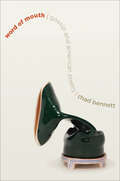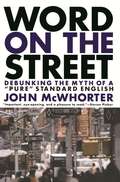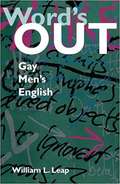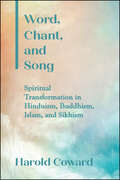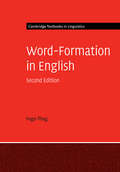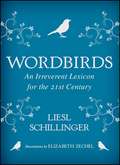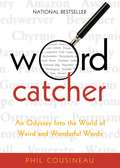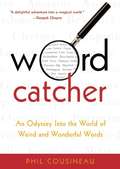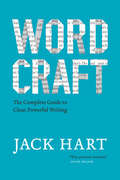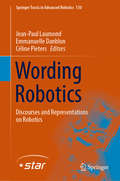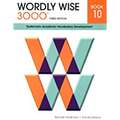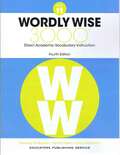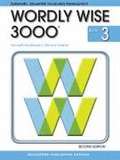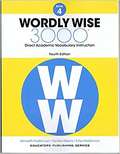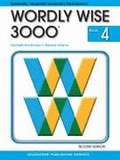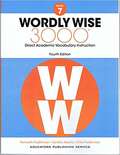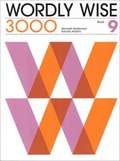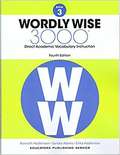- Table View
- List View
Word of Mouth: Gossip and American Poetry (Hopkins Studies in Modernism)
by Chad BennettThe first study of modern and contemporary poetry’s vibrant exchange with gossip.Can the art of gossip help us to better understand modern and contemporary poetry? Gossip’s ostensible frivolity may seem at odds with common conceptions of poetry as serious, solitary expression. But in Word of Mouth, Chad Bennett explores the dynamic relationship between gossip and American poetry, uncovering the unexpected ways that the history of the modern lyric intertwines with histories of sexuality in the twentieth century. Through nuanced readings of Gertrude Stein, Langston Hughes, Frank O’Hara, and James Merrill—poets who famously absorbed and adapted the loose talk that swirled about them and their work—Bennett demonstrates how gossip became a vehicle for alternative modes of poetic practice. By attending to gossip’s key role in modern and contemporary poetry, he recognizes the unpredictable ways that conventional understandings of the modern lyric poem have been shaped by, and afforded a uniquely suitable space for, the expression of queer sensibilities.Evincing an ear for good gossip, Bennett presents new and illuminating queer contexts for the influential poetry of these four culturally diverse poets. Word of Mouth establishes poetry as a neglected archive for our thinking about gossip and contributes a crucial queer perspective to current lyric studies and its renewed scholarly debate over the status and uses of the lyric genre.
Word on the Street: Debunking the Myth of a "Pure" Standard English
by John McwhorterThough there is a contingent of linguists who fight the fact, our language is always changing--not only through slang, but sound, syntax, and words' meanings as well. Debunking the myth of "pure" standard English, tackling controversial positions, and eschewing politically correct arguments, linguist John McWhorter considers speech patterns and regional accents to demonstrate just how the changes do occur. Wielding reason and humor, McWhorter ultimately explains why we must embrace these changes, ultimately revealing our American English in all its variety, expressiveness, and power.
Word's Out: Gay Men's English
by William L. Leap<p>Do gay men communicate with each other differently than they do with straight people? If they do, how is "gay men's English?" different from "straight English"? This work addresses these questions and looks at gay men's English as a cultural and a linguistic phenomenon. This text focuses not on items of vocabulary, word history and folklore but on linguistic practices - co-operation, negotiation and risk-taking - which underlie gay men's conversations, storytelling, verbal duelling, self-description and construction of outrageous references. <p>The author "reads" conversations for covert and overt signs of gay men's English, using anecdotes drawn from gay dinner parties, late-night airplane flights, restaurants, department stores and gourmet shops, and other all-gay and gay/straight settings. He incorporates material from other interviews and discussions with gay men, life-story narratives, gay magazines, newspapers, books and material from his own life. The topics addressed include establishing the gay identities of "suspect gays", recollections of gay childhood, erotic negotiation in health club locker rooms, and gay men's language of AIDS. <p>The text shows how gay English speakers use language to create gay-centred spaces within public places, to protect themselves when speaking with strangers, and to establish common interests when speaking with "suspect gays". It also explores why learning gay English is a critical component in gay men's socialization and the acquisition of gay culture.</p>
Word, Chant, and Song: Spiritual Transformation in Hinduism, Buddhism, Islam, and Sikhism (SUNY series in Religious Studies)
by Harold CowardIn academic religious studies and musicology, little attention has been given to chanted word, hymns, and songs, yet these are often the key spiritual practices for lay devotees. To address this gap in knowledge, Harold Coward presents a thematic study of sacred sound as it functions in word, chant, and song for devotees in the Hindu, Buddhist, Islamic, and Sikh traditions. Each chapter begins with a brief introduction of a particular tradition's word/scripture, followed by case studies showcasing the diversity of understanding and the range of chant and song in devotee practice, and concludes with a brief illustration of new trends in music and chant within the tradition. Written in a style that will appeal to both scholars and lay readers, technical terms are clearly explained and case studies explicitly include devotees' personal experiences of songs and chants in public and private religious ritual.
Word-Formation in English
by Ingo PlagProviding an accessible introduction to the study of word-formation, this text focuses specifically on English. Assuming no prior linguistic knowledge, Ingo Plag explains the fundamentals of word-formation, demonstrating how morphemes--the elements of a word's internal structure--can function to relate words to other words, and to create new words. Students are encouraged to undertake their own morphological analysis of English words, and are introduced to the methodological tools for obtaining and analyzing relevant data.
Word-Formation in English: Word-formation In English (Cambridge Textbooks in Linguistics)
by Ingo PlagThis book is the second edition of a highly successful introduction to the study of word-formation, that is, the ways in which new words are built on the bases of other words (e.g. happy - happy-ness), focusing on English. The book's didactic aim is to enable students with little or no prior linguistic knowledge to do their own practical analyses of complex words. Readers are familiarized with the necessary methodological tools to obtain and analyze relevant data and are shown how to relate their findings to theoretical problems and debates. The second edition incorporates new developments in morphology at both the methodological and the theoretical level. It introduces to the use of new corpora and data bases, acquaints the reader with state-of-the-art computational algorithms modeling morphology, and brings in current debates and theories.
Word-Formation in the World's Languages
by Pavol Štekauer Salvador Valera Lívia Körtvélyessy Pavol Štekauer Salvador ValeraA pioneering book establishing the foundations for research into word-formation typology and tendencies. It fills a gap in cross-linguistic research by being the first systematic survey of the word-formation of the world's languages. Drawing on over 1500 examples from fifty-five languages, it provides a wider global representation than any other volume. This data, from twenty-eight language families and forty-five language genera, reveals associations between word-formation processes in genetically and geographically distinct languages. Data presentation from two complementary perspectives, semasiological and onomasiological, shows both the basic functions of individual word-formation processes and the ways of expressing selected cognitive categories. Language data was gathered by way of detailed questionnaires completed by over eighty leading experts on the languages discussed. The book is aimed at academic researchers and graduate students in language typology, linguistic fieldwork and morphology.
Wordbirds: An Irreverent Lexicon for the 21st Century
by Liesl Schillinger Elizabeth ZechelIf you've escaped binary confinement and find yourself rushing cell-mell to a clusterfete-- slurpwalking as you commutikaze--then who are you? You are a typical citizen of the young millennium, caught up in the fast-paced megatasking socio-professional whirl of our ever-evolving digitally-enhanced lives. If you've ever wondered what to call it when you answer the TV remote instead of the phone, or wished you had a phrase to capture your supervisor's stealth campaign to stall your career, here is your guide. Now you can say "Oops, droidian slip " with ease, and call out your boss for the impedimentor that he is. Armed with "Wordbirds," you will be able to skillfully talk your way into, or out of, any situation the twenty-first century throws at you. With 150 gorgeous, Audubony, highly expressive bird illustrations, these neologisms will have you crowing with delight, and show you that fine feathers make fine words. Why birds, you may ask? Hadn't you heard? The bird is the word. Now stop deliberotting and open this book.
Wordcatcher
by Phil CousineauWho knew that the great country of Canada is named for a mistake? How about "bedswerver," the best Elizabethan insult to hurl at a cheating boyfriend? By exploring the delightful back stories of the 250 words in Wordcatcher, readers are lured by language and entangled in etymologies. Author Phil Cousineau takes us on a tour into the obscure territory of word origins with great erudition and endearing curiosity. The English poet W. H. Auden was once asked to teach a poetry class, and when 200 students applied to study with him, he only had room for 20 of them. When asked how he chose his students, he said he picked the ones who actually loved words. So too, with this book - it takes a special wordcatcher to create a treasure chest of remarkable words and their origins, and any word lover will relish the stories that Cousineau has discovered.
Wordcatcher: An Odyssey into the World of Weird and Wonderful Words
by Phil CousineauBy exploring the delightful back stories of the 250 words in Wordcatcher, readers are lured by language and entangled in etymologies. Author Phil Cousineau takes us on a tour into the obscure territory of word origins with great erudition and endearing curiosity.
Wordcatcher: An Odyssey into the World of Weird and Wonderful Words
by Phil CousineauWho knew that the great country of Canada is named for a mistake? How about "bedswerver," the best Elizabethan insult to hurl at a cheating boyfriend? By exploring the delightful back stories of the 250 words in Wordcatcher, readers are lured by language and entangled in etymologies. Author Phil Cousineau takes us on a tour into the obscure territory of word origins with great erudition and endearing curiosity. The English poet W. H. Auden was once asked to teach a poetry class, and when 200 students applied to study with him, he only had room for 20 of them. When asked how he chose his students, he said he picked the ones who actually loved words. So too, with this book -- it takes a special wordcatcher to create a treasure chest of remarkable words and their origins, and any word lover will relish the stories that Cousineau has discovered.
Wordcraft: The Complete Guide to Clear, Powerful Writing (Chicago Guides to Writing, Editing, and Publishing)
by Jack HartLegendary writing coach Jack Hart spent twenty-six years at the Oregonian and has taught students and professionals of all stripes, including bloggers, podcasters, and more than one Pulitzer Prize winner. Good writing, he says, has the same basic attributes regardless of genre or medium. Wordcraft shares Hart’s techniques for achieving those attributes in one of the most broadly useful writing books ever written. Originally published in 2006 as A Writer’s Coach, the book has been updated to address the needs of writers well beyond print journalists. Hart breaks the writing process into a series of manageable steps, from idea to polishing. Filled with real-world examples, both good and bad, Wordcraft shows how to bring such characteristics as force, brevity, clarity, rhythm, and color to any kind of writing. Wordcraft now functions as a set with the second edition of Hart’s book Storycraft, on the art of storytelling, also available from Chicago.
Wording Robotics: Discourses and Representations on Robotics (Springer Tracts in Advanced Robotics #130)
by Jean-Paul Laumond Emmanuelle Danblon Céline PietersRobots challenge humans’ beliefs and expectations. Hence, regardless of whether they are the audience of a conference, the visitors of a lab, the citizens in general, some journalists, or the European Parliament, the first step in order to gain a better understanding of the field of robotics is obviously to consult the experts. Roboticists seem indeed to be in the best position to guide society in this matter, whether it is in the everyday life or within an official institution. Today however, there is a gap between the robots, as they are actually thought and built, and the intelligent and autonomous machines, as they are perceived by the society. How can we explain it? Do the words borrowed from the living organisms and used to describe robots play a role in the confusion about the status of the discipline of robotics? The texts gathered within this book focus on the problematic of wording robotics from various perspectives. They are the results of a unique interdisciplinary meeting gathering roboticists, linguists, philosophers and neuroscientists, the 4th Workshop of Anthropomorphic Motion Factory held at LAAS-CNRS in Toulouse on Nov 31st - Dec 1st 2017.
Wordly Wise 3000 Direct Academic Vocabulary Instruction Book 5 (Fourth Edition)
by Kenneth Hodkinson Sandra Adams Erika HodkinsonWordly Wise 3000, 4th Edition, Book 5 contains 20 lessons with 15 words per lesson and focuses on preparing students to be able to decipher words they'll encounter in content area texts, literature, and tests. Lessons begin with word lists that include definitions with contextual sentences, much like dictionary entries; a selection of activities follow the word list, which may include matching words and definitions, matching synonyms and antonyms, identifying whether words were used correctly in a particular context, sentence completions, reading passages followed by comprehension questions, discussion/writing extension ideas, and other exercises.
Wordly Wise 3000 Direct Academic Vocabulary Instruction Book 6 (Fourth Edition)
by Kenneth Hodkinson Sandra Adams Erika HodkinsonBuild vocabulary along with reading, writing, and critical thinking skills with Wordly Wise 3000! Wordly Wise 3000, 4th Edition, Book 6 contains 20 lessons with 15 words per lesson and focuses on preparing students to be able to decipher words they'll encounter in content area texts, literature, and tests. Lessons begin with word lists that include definitions with contextual sentences, much like dictionary entries; a selection of activities follow the word list, which may include matching words and definitions, matching synonyms and antonyms, identifying whether words were used correctly in a particular context, sentence completions, reading passages followed by comprehension questions, discussion/writing extension ideas, and other exercises .
Wordly Wise 3000 Direct Academic Vocabulary Instruction Book 8 (Fourth Edition)
by Kenneth Hodkinson Sandra Adams Erika HodkinsonWordly Wise 3000, 4th Edition, Book 8 contains 20 lessons with 15 words per lesson and focuses on preparing students to be able to decipher words they'll encounter in content area texts, literature, and tests. Lessons begin with word lists that include definitions with contextual sentences, much like dictionary entries; a selection of activities follow the word list, which include replacing a phrase with a word from the list that means the same thing, identifying the correct definition, choosing the best word to complete a sentence, identifying synonyms, reading passages followed by comprehension questions, discussion/writing extension ideas, and other exercises.
Wordly Wise 3000 Book 10: Systematic Academic Vocabulary Development
by Kenneth Hodkinson Sandra Adams<P>Obviously, it's important to know what words mean.<P> Your studies so far in school have proven that time and time again. <P>We might be tempted to skip words we don't know--particularly difficult words--when we see them in textbooks.<P> But this affects how well we understand what we read.
Wordly Wise 3000 Book 3 [Workbook]
by Kenneth Hodkinson Sandra AdamsWords from literature, textbooks, and the SAT--words most likely to appear on high-stakes tests. Student books include 150 words per level in books 2-3 and 300 new words per level in books 4-12.
Wordly Wise 3000 Book 4
by Kenneth Hodkinson Sandra Adams Erika Hodkinson<p>You've been learning words since you were a tiny baby. At first, you learned them only by hearing other people talk. Now that you are a reader, you have another way to learn words. Obviously, it's important to know what words mean, but lots of times, we think we can get away without knowing some of them as we read. This could cause a problem. Say you are reading the directions for a new game. You know most of the words in the sentence you're reading. Then you stop for a word you don't recognize: Please do not touch the blegmy or your score will be lost. You ask yourself, "What is a blegmy?" At first you think, "Well, it's only one word." But then you think, "What is it that I'm not supposed to touch?" All of a sudden, knowing what that one word means is important! <p>Clearly, the more words you know, the better your understanding of everything you read. Wordly Wise 3000 will help you learn a lot of words, but it can't teach you all the words you'll ever need. It can, however, help guide your learning of new words on your own.</p>
Wordly Wise 3000 Book 4 [Workbook]
by Kenneth Hodkinson Sandra AdamsWords from literature, textbooks, and the SAT--words most likely to appear on high-stakes tests. Student books include 150 words per level in books 2-3 and 300 new words per level in books 4-12.
Wordly Wise 3000 Grade 3 Student Book: 2nd Edition (Wordly Wise 3000 Ser. #3)
by Kenneth Hodkinson Sandra AdamsWORDLY WISE 3000 SECOND EDITION BOOK 3
Wordly Wise 3000, Grade 7: Direct Academic Vocabulary Instruction (Fourth Edition)
by Kenneth Hodkinson Sandra Adams Erika HodkinsonThe more words you know, the better your understanding of everything you read. Wordly Wise 3000 will help you learn a lot of words, but it can't teach you all the words you'll ever need. It can, however, help guide your learning of new words on your own.
Wordly Wise 3000: Book 9 (Wordly Wise 3000 Ser.)
by Kenneth Hodkinson Sandra AdamsIn Wordly Wise 3000 Book 9, each 15-word lesson begins with an alphabetized Word List that gives pronunciations, parts of speech, and concise definitions, and uses each word in a sentence.
Wordly Wise 3000: Direct Academic Vocabulary Instruction (Fourth Edition) (Medieval Mysteries #3)
by Erika Hodkinson Kenneth Hodkinson Sandra AdamsWordly Wise 3000 can't teach you all the words you'll need, but it will help you learn lots of them. It can also help you learn how to learn even more words.
